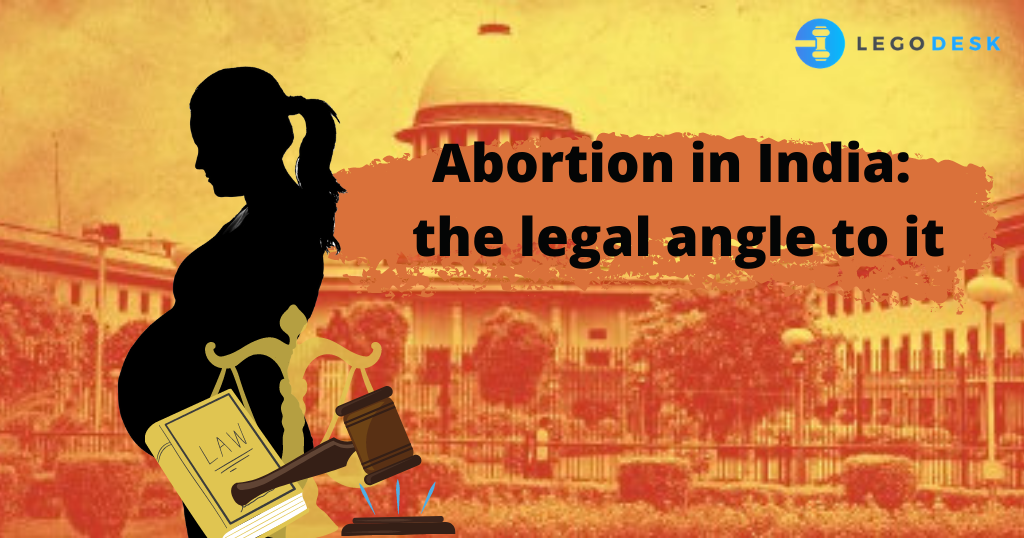Abortion in India: the legal angle to it
Abortion was stated as legal in India in 1971; still, many people in rural India do not know about this. And, still many in urban areas are not familiar with the Abortion Laws. India is one of the countries in the world which has the largest number of deaths because of unsafe abortion. Despite more than 30 years of liberal legislation; the majority of women in India still lack access to safe abortion care.

Abortion law: policies and services in India
The government statement said: “The Medical Termination of Pregnancy bill; 2020 is for expanding access of women to safe and legal abortion services on therapeutic, eugenic, humanitarian or social grounds. It is a step towards the safety and well-being of the women and many women will benefit from this.
Recently; several petitions were received by the Court asking permission for aborting pregnancies at a gestational age beyond the present legal limit; on grounds of fetal abnormalities or pregnancies due to sexual violence faced by women. The proposed increase in gestational age will ensure dignity, autonomy, confidentiality, and justice for women who need to terminate the pregnancy.”
Read Also – Average Age to Have Baby in India
The MTP Act No.34 of 1971:
This act gives full protection to a registered medical practitioner against any legal or criminal proceedings, for any injury caused to a woman seeking abortion; given that the abortion had been done in good faith under terms of the Act.
The Act allow an unwanted pregnancy to be aborted up to 20 weeks of pregnancy; and requires a second doctor’s approval if the pregnancy is above 12 weeks.
The Medical Termination of Pregnancy Rules and Regulations 1975; define the criteria and procedures for approval of an abortion facility, procedures for consent, keeping records and reports, and ensuring confidentiality.
Read Also – Top 10 Legal Rights Every Women Should Know
Any termination of pregnancy done at a hospital or other place without taking the approval of the Government is illegal. The responsibility is on the hospital to obtain prior approval.
In February 2020, the Union Cabinet cleared a long-pending change to the Medical Termination of Pregnancy Act; 1971. That raised the legal permission limit for an abortion to 24 weeks from the current 20 weeks. Following the efforts of the Health Ministry; the change also accepts the failure of contraception as a valid reason for abortion. And not just in married but also in unmarried women.
Abortion in India and sex determination
The Prenatal Diagnostic Techniques (Regulation and Prevention of Misuse) Act (PNDT Act) 1994. This was later changed as the pre-conception; pre-natal sex selection and determination Act 2002. This act prohibits the misuse of diagnostic tests for the purpose of sex determination; which may lead to the abortion of female fetuses. Any procedure or technique performed on a woman for the purpose of sex-determination is illegal.
Read Also – Complete Guideline About Sexual Crime in India
Since the abortion of female fetuses is high in India; you and your doctor will receive punishment for giving a diagnostic test to find out the sex of your child.
However, doctors do sex finding tests to find certain abnormalities in the fetus; or if you are above 35 years of age and suffer from any health-specific problems.
Social interpretation
The abortion laws have always been open to different points of view and though our present social and political state allows more broad views in most cases. The danger of shallow views has always been there, without a single word of law being changed.
The constitution does not guarantee the right to abort for women in India; the MTP Act, 1971, itself has limited this to provide ‘termination of pregnancy’ in some cases only. Right to life and personal freedom is the most precious, and fundamental of all the fundamental rights of citizens.
This guarantee imposes a limit on the government; it is part of the cultural and social consciousness of the community in India. In this context, every woman owes an individual right; the right to her life, to her liberty, and to receive the happiness that gives her the right to have an abortion.
Read Also – Is the doctor a gazetted officer?
Illegal abortion in India under the law
In IPC section 312 to 316, it states as to when the abortion is illegal and punishable under the law. The law also states that causing a miscarriage is a crime under this code.
The person causing the miscarriage will receive up to three years of imprisonment along with fine. Especially, if the miscarriage is not because of good intention or the purpose of saving the woman’s life.
However, abortion in India is permissible under Section 312. This means in order to protect the life of the mother, if abortion is necessary, then it’s not an crime.
Legality of abortion depends on the given cases:
- Exposure of the fetus to radiation.
- The fetus is suffering from RH disease.
- The pregnancy is the result of rape.
- Any of a woman’s previous children had abnormalities.
- A woman’s economic status may not enable a healthy pregnancy.
- A contraceptive failed.
Conclusion
In a country like India, women need family consent before they even visit the hospital. However, the MTP Act gives adult women the right to decide for themselves. A doctor cannot ask for anybody’s consent except for the mother’s.
Improving women’s access to information and understanding of their rights and entitlements will give them greater control over their reproductive health decisions, thereby promoting healthier outcomes.